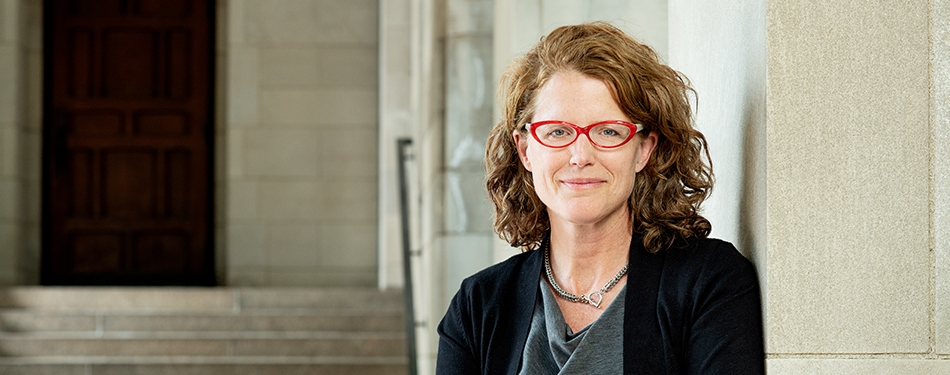Leading citizenship and immigration law scholar Kristin Collins to join Michigan Law faculty.
One of the nation’s most prominent legal scholars in the areas of citizenship and immigration law, Kristin Collins, will be joining the University of Michigan Law School faculty, pending Regental approval, as a professor of law in 2023.
Originally from North Carolina, Collins earned her law degree from Yale University and is ecstatic about her move to Ann Arbor.
“I don’t think I could ask for a better set of colleagues and students to work with,” Collins said. “There is a cluster of brilliant legal scholars and historians at the University of Michigan with whom I have overlapping interests. And the students are fantastic. One of the best parts of being a law professor is working closely with students in seminars and as research assistants, and I cannot wait to continue that work with the students at Michigan.”
Immigration and citizenship expertise, grounded in work on gender equality and family law
Collins’ interest in immigration and citizenship law grows out of her earlier work on gender equality and family law.
“It is no secret that family status plays a central role in America’s current immigration laws, but we know far less about how and why that is the case,” she said.
The official machinery that regulates our borders is incredibly powerful. It is vitally important that experts engage in thoughtful critique of such a profound exercise of legal authority.
Collins has penned articles and essays for leading journals such as the Harvard Law Review, Law and History Review, and the Duke Law Journal.
She has brought her scholarship to broader audiences by co-authoring editorials for mainstream outlets such as the Los Angeles Times and Slate. Collins is also regularly consulted as an expert on immigration and citizenship cases and has authored or co-authored several amicus briefs.
“The official machinery that regulates our borders is incredibly powerful,” she said. “It is vitally important that experts engage in thoughtful critique of such a profound exercise of legal authority.”
Collins’ 2014 article in the Yale Law Journal, “Illegitimate Borders: Jus Sanguinis Citizenship and the Legal Construction of Family, Race, and Nation,” examines the complex set of statutes governing the citizenship status of children born to American parents outside the United States. Informed by extensive archival research, Collins exposed the administrative, judicial, and legislative history of what she describes as a “woefully misunderstood area of law.”
She also demonstrated how those laws were shaped by ideas about race and gender typical of an earlier era. The Supreme Court cited Collins’ work multiple times in its 2017 ruling on Sessions v. Morales-Santana, which held that the challenged citizenship statute was unconstitutional.
Collins’ current book project, tentatively titled “Blood and Nation: Making the Citizen Family in American Law,” more fully examines the relationship of family status and political status and continues taking her to archives across the country.
“When you ask careful questions about the law and its origins, you obviously gain new and important insights about the past,” Collins said. “You also gain a deeper understanding of how you can improve the law today.”
Collins noted that American citizenship and immigration laws have always had profound implications for individuals, families, and children—both within the United States and far beyond its borders.
“Because there is just so much at stake for people in these areas of law, it really behooves us to understand how we got to where we are today,” Collins said.
Inspired by the high stakes of the legal system
Soon after graduating from law school, Collins witnessed the significant influence of the law and the courts during her yearlong clerkship with the Hon. Kimba M. Wood of the U.S. District Court for the Southern District of New York. There, Collins recalls a criminal defendant wailing upon hearing the guilty verdict in her layered and complicated fraud case.
“It was a real-life lesson in the importance of fair process, transparency, and careful deliberation, and a reminder of what’s at stake for real people who find themselves involved in the legal system,” Collins said.
In the classroom, Collins hopes to help students see the human side of the law and gain an earnest appreciation for the details, even the most granular ones. She acknowledges that students often enter her first-year course in civil procedure with muted enthusiasm for a seemingly dry topic. (Collins says civil procedure is often seen as the “spinach” of the first-year curriculum.)
Yet, she aims to help students see the foundational legal principles at work in the minutia of the rules that govern federal litigation.
“Civil Procedure provides a perfect introduction to the remarkable authority of legal institutions, and the care they should use in exercising that authority,” Collins said. She is hopeful students carry that lesson into their upper-level courses and into their legal careers.
Collins spent the last 16 years as a professor at Boston University School of Law.
Before becoming a professor, she clerked for two federal judges – Judge Wood and Chief Judge John M. Walker of the U.S. Court of Appeals for the Second Circuit. Collins also served as a senior fellow at the Institute for Democracy South Africa in Cape Town, where she conducted research on the role of the courts in South Africa’s ongoing process of democratization, and worked as an associate at a civil rights firm in New York City, Emery Celli Brinckerhoff & Abady.
—Daniel P. Smith

